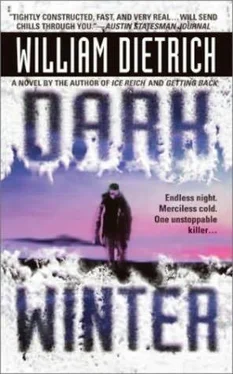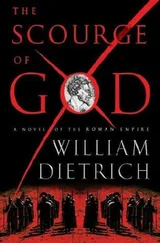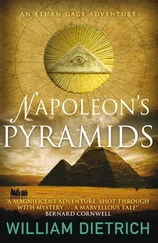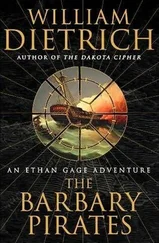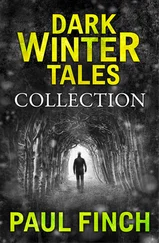William Dietrich - Dark Winter
Здесь есть возможность читать онлайн «William Dietrich - Dark Winter» весь текст электронной книги совершенно бесплатно (целиком полную версию без сокращений). В некоторых случаях можно слушать аудио, скачать через торрент в формате fb2 и присутствует краткое содержание. Жанр: Триллер, на английском языке. Описание произведения, (предисловие) а так же отзывы посетителей доступны на портале библиотеки ЛибКат.
- Название:Dark Winter
- Автор:
- Жанр:
- Год:неизвестен
- ISBN:нет данных
- Рейтинг книги:3 / 5. Голосов: 1
-
Избранное:Добавить в избранное
- Отзывы:
-
Ваша оценка:
- 60
- 1
- 2
- 3
- 4
- 5
Dark Winter: краткое содержание, описание и аннотация
Предлагаем к чтению аннотацию, описание, краткое содержание или предисловие (зависит от того, что написал сам автор книги «Dark Winter»). Если вы не нашли необходимую информацию о книге — напишите в комментариях, мы постараемся отыскать её.
Dark Winter — читать онлайн бесплатно полную книгу (весь текст) целиком
Ниже представлен текст книги, разбитый по страницам. Система сохранения места последней прочитанной страницы, позволяет с удобством читать онлайн бесплатно книгу «Dark Winter», без необходимости каждый раз заново искать на чём Вы остановились. Поставьте закладку, и сможете в любой момент перейти на страницу, на которой закончили чтение.
Интервал:
Закладка:
"Exactly," said Lewis, now the lecturer. In geology he wasn't the fingie. "Compared to many of the metallic meteorites, this looks boring to us. Ordinary. That's because it's a common kind of rock found on earth but a rare kind to come from space. Most meteorites have more iron and nickel. They date from the dawn of the solar system. This one came later in history, after the place of its origin had experienced some kind of heating and melting and igneous rock had formed, like the earth's crust."
Moss was nodding. He was eager for confirmation.
"That suggests it didn't come from the usual source like asteroids or comets," Lewis went on. "It probably came from the moon. Or Mars. Blasted into space eons ago after a bigger meteorite, maybe a mile across, slammed into the red planet. Ejected and captured by earth's gravity like the one they found in the Allan Hills, the famous one they thought might have fossil evidence of Martian microbes."
Moss allowed himself a hint of eagerness. "Could this one have fossils inside?"
"There's been no agreement they exist in the other one. But this kind of meteorite is rare and even the remotest possibility makes it pretty valuable. We can't be sure what this is at all, of course- not with me. I don't have the instruments and I don't have the expertise. The way they confirmed things in Houston was by analyzing ancient gas trapped in the meteorite and finding it matched the Martian atmosphere."
"It may not be Martian at all," Moss allowed. He wanted more hope.
"No. Only sixteen have been found worldwide. But… it looks possible to me," Lewis gave him. "An achondrite, the kind of meteorite that would come from a planet or the moon. Sparco says you have a spectroscope down here and I brought some stuff to reduce a sample for a gas-spectrum analysis. I can also slice a small cross section and look at its composition under the microscope. I'll test for oxygen and oxidized iron isotopes. Check its magnetism, which indicates how much ferric iron. If it's a simple plagioclasepyroxene basalt, or maybe olivine, it will be promising. Radioactive dating of a young age will persuade even more. We'll need some photos and a statement to authenticate its place of origin. And then you take it to Houston, or wherever."
Moss nodded, watching him. "Yes. Wherever." He hesitated. "Jim told me I could trust another question to you."
Lewis had been waiting for this. "Its commercial value?" This opinion was Sparco's price for his being allowed to come down here. He was to assess, and then keep his mouth shut. He'd wanted purpose, and this was his ticket.
"As another measure of its importance."
"Private collection of scientific artifacts is booming," Lewis said. "Having a living-room museum has become cool among the ultrarich. The mere possibility this could be from Mars will be enough for some buyers. The chance it could hold evidence of extraterrestrial life trumps all. That rock could be worth a lot of money."
"How much money?"
Lewis had researched this. "Pieces of Mars have sold for twenty-five hundred dollars a gram."
"Which makes this rock worth…"
"Several million dollars."
Moss nodded solemnly.
"Pieces of the moon are even rarer and have fetched ten times that. The Apollo rocks turned out to be from a concentrated region of unusually high radioactivity, so lunar meteorites tell us more about the moon than what the astronauts brought back. They've fetched twenty-five hundred times the price of gold."
"Astonishing," Moss said. He didn't seem very astonished.
"But everything here is the property of the American government, right?"
"If they know about it," the scientist said, looking evenly at Lewis.
"It's an American base. American taxpayer dollars." No one was allowed to hunt for souvenirs in Antarctica, Lewis knew. They told you that up front.
"Is it?" Moss asked. "To you, just stepping off the plane, looking at that ragged flag, I suppose it is. But to me…" The scientist pointed to the wall above his desk. It was papered with pictures of himself with a stream of celebrities: visiting congressmen, presidential science advisors, adventurers, network anchors, movie stars, foreign dignitaries. Mickey Moss as polar landlord. "It's not American land. Not American ice. It's nobody's ice, except the people willing to come down here and pioneer it."
"And you pioneered it."
"Exactly."
"But at government expense, right?"
"At personal sacrifice!" Moss took a breath. "Listen, young man, I know I look like an old egghead to you, sitting here in my warm office, surrounded by vinyl and plastic. But I was doing science down here when you were sucking at your mother's tit. I was doing science when we slept in plywood barracks and ate out of tin cans and didn't get a letter or a radio call for months at a time. I did science until I was frostbitten so bad that when I came back inside it felt like my face was being held to a hot iron."
"I understand."
"No, you don't. You can't. No one can who didn't do it. And I gave the testimony that helped build this building. I dragged the Washington bureaucrats down here kicking and screaming and got them to see that this place-this godforsaken place- was the best place for certain kinds of science in the entire world. The Pole was the ringside seat when that comet plowed into Jupiter in 1994. It's going to help us remap the universe, decipher our magnetic field, understand our atmosphere. We've got telescopes out in the snow that can see in half a dozen ways the human eye is blind to. Because for half the year the sun never sets and for the other half we have a constant dark sky. Because I, Mickey Moss, showed them the way."
"I think everyone respects that."
"Do they?"
"Sure."
"I used to think respect was enough." He sat down, looking at the rock.
"They'll probably name something for you."
"When I'm dead." He picked up the meteorite. "They scoff at me now, you know. Geezer Mouse. Don't think I don't know."
"They're jealous. Academic rivalry."
"They don't understand my project has to have priority. Priority! To justify the Pole. To justify the new South Pole station."
Lewis waited.
"I'm just saying that I've paid my dues."
"I'm not arguing, Doctor Moss."
The scientist turned the meteorite over in his hands. "I've made no decisions," he said softly. "It's just that I'm getting old. I had to fudge my medical exam to get down here last time. I don't have endless time anymore. I haven't put a lot away. My family…" He glanced up. "Are you surprised to find me human, Lewis?"
"No." Lewis shifted uncomfortably. He was surprised, actually. It didn't fit his stereotype of a grand old man of science. "It's just that Jim Sparco wanted a rough evaluation. He didn't talk about keeping it."
"Nor have I! Nor have I." He looked at Lewis warily. "Don't jump to conclusions. Don't start rumors that aren't true. I've got a reputation, and in the end a reputation is all a scientist has. Thirty years in this place, and that's all I have. And then at the end a missive from space, a stroke of luck… Why?"
Lewis couldn't answer.
"Well. The first step was to get your opinion, correct? Now we've got some thinking to do. What's best? What's right? What's fair? That's always the question, isn't it?"
"The unanswerable one, sometimes."
"Yet you must choose an answer." Moss stood and put the rock back in his filing cabinet. "The funny thing is, there're almost no locks on this base. That's why you can't breathe a word of this to anyone."
"Don't you want to kick this around with the other scientists?"
"No." He looked depressed. "Word would leak, misinterpretations would be made. They're jealous, like you said. They'd use this against me."
"I could be wrong about the meteorite, you know."
Читать дальшеИнтервал:
Закладка:
Похожие книги на «Dark Winter»
Представляем Вашему вниманию похожие книги на «Dark Winter» списком для выбора. Мы отобрали схожую по названию и смыслу литературу в надежде предоставить читателям больше вариантов отыскать новые, интересные, ещё непрочитанные произведения.
Обсуждение, отзывы о книге «Dark Winter» и просто собственные мнения читателей. Оставьте ваши комментарии, напишите, что Вы думаете о произведении, его смысле или главных героях. Укажите что конкретно понравилось, а что нет, и почему Вы так считаете.
